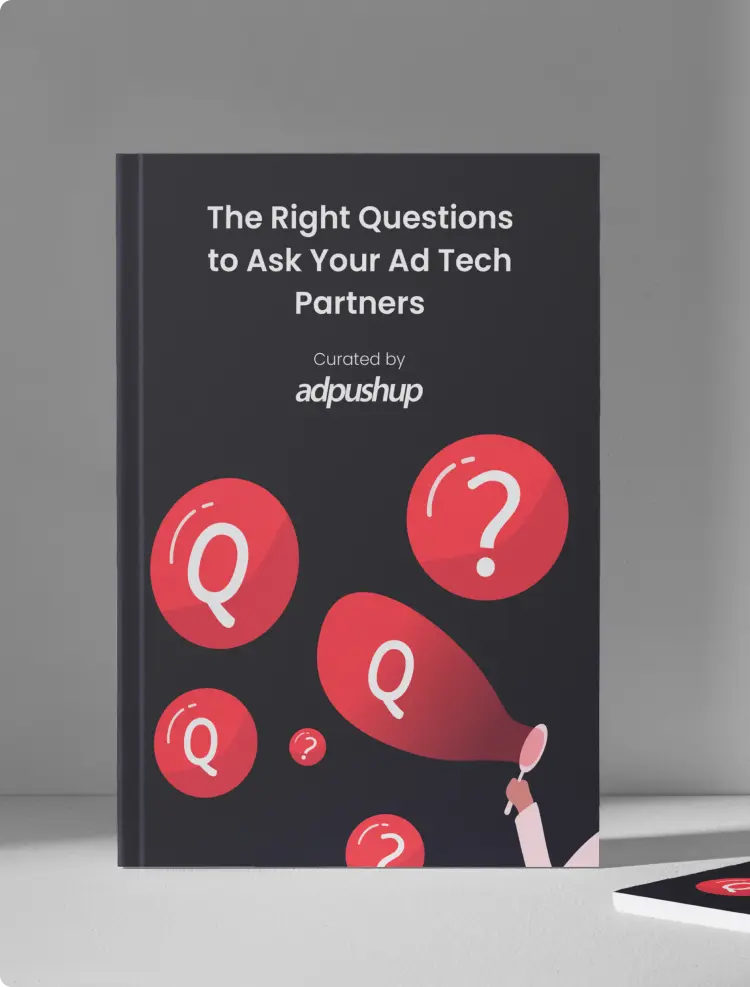
Learn about the advantages and impact of Google MCM (Multiple Customer Management) in this informative blog. Discover how it can enhance customer relationships, streamline processes, and boost business growth.
The ad tech industry is a volatile space and subject to constant changes. A lot of developments in the industry are occurring to get on board with the privacy-focused tide. Naturally, Google wants to ensure that its offerings align with the changing nature of the digital advertising landscape.
Google’s decision to replace SPM (Scaled Partner Management) with Google MCM (Multi Customer Management) has been carried out in the same spirit – to make the process more transparent and secure for publishers.
SPM was migrated into MCM on February 1, 2022, and many things have changed since then. This transition has brought about a wave of transformation that has left its mark on publishers and advertisers alike.
In this blog, we aim to discuss everything related to this new development-
- What is SPM (Scaled Partner Management)?
- What is MCM (Multiple Customer Management)?
- Why is MCM replacing SPM?
And all the other tidbits that publishers need to know at this point.
What is Google MCM?
The beta version of Google MCM was made available for a select few GAM 360 users in August 2020. This was done per Google’s decision to eventually replace SPM with MCM in July 2021.
The idea here is the same – SPM, MCM facilitates Google AdX access for small and medium-sized publishers via large publishers and channel partners. The parent publisher can manage and control the child publisher’s ad inventory on their behalf.
The primary thing that has changed here is the introduction of delegation types for defining the authorization level of the child and parent publishers in a better way.
The two delegation types are Manage Account and Manage Inventory. The parent publisher invites the child publisher; however, other specifications differ for different delegations.
MCM’s Delegation Types
Manage Account
- The parent publisher manages all the websites under the child publisher’s account.
- Both parties decide upon the revenue share (0% to 100%). The agreed price is applied to all accounts of the child-parent managed by the parent publisher.
- Google sends the agreed-upon payment to the child and parent publishers through auto-payment.
- A child publisher can have one parent publisher to manage their accounts.
- The parent publisher gets access to the account of the child publisher.
- The child publisher uses their own GAM tags.
Managed Inventory
- The parent publisher manages the inventory that the child publisher delegates. The former is responsible for monetizing the delegated inventory.
- The parent publisher is only responsible for managing the specific inventory the child publisher has delegated.
- Google pays the parent publisher, and the child publisher receives payment from the parent publisher.
- A child publisher can have up to 15 parent publishers to manage their inventory.
- The parent publisher cannot access the child publisher’s account.
- Child publishers have to use the parent publisher’s GAM tags.
Now, which type of delegation should you choose? That decision lies with you and must be carried out by considering all your needs. Parameters will vary for each of the delegation types. You need to see what kind of MCM partner will bring you the most value.
What is Scaled Partner Management?
Everyone knows that Google Ad Exchange demand is the best that there is. However, not every publisher can access it on their own. To be eligible for accessing Google AdX, a publisher needs to have 5 million monthly pageviews and a Google Ad Manager account.
Therefore, it is almost impossible for small and mid-sized publishers to access AdX independently. But they can leverage the same through Google’s SPM program.
Google’s SPM program enables publishers (the Child publisher) to access Google AdX through channels and large partners (the SPM partner or Parent Publisher).
This is how it works – the small publisher, aka the child publisher, can use the AdX account of the large publisher/channel partner, the parent publisher, and access Google AdX. The child publisher can open up their inventories to many advertisers, increasing the value of their inventory.
Another thing to note here is that the SPM partner can operate and manage the child publisher’s inventory on their behalf. This means that the publisher further benefits from ad optimization and enhanced yield management.
Now let’s take a look at what is MCM (Multiple Customer Management)
Why is Google MCM Taking Over SPM?
But why exactly is MCM replacing SPM? The key focus here is enhancing the transparency of the partnership between publishers and SPM partners. With the introduction of MCM, Google has attributed improved clarity regarding the authorization level of the partnership between child and parent publishers. All in all, this initiative aims to facilitate a more transparent and efficient environment for both parties involved in the partnership.
Google MCM (Multiple Customer Management) Vs. Scaled Partner Management
| Features | Google MCM | Google SPM |
| Google AdX access | ✅ | ✅ |
| Access to Open Bidding | ✅ | ❌ |
| Programmatic Direct and Guaranteed support | ✅ | ❌ |
| Preferred deals support | ✅ | ❌ |
Why Should You Opt for Google MCM (Google MCM Advantages)?
In online publishing, maximizing ad revenue is one of the top priorities for publishers. This is where Google MCM comes into play, providing various benefits that can significantly enhance a publisher’s monetization efforts.
So let’s explore some of the key benefits that MCM brings to the table.
Expanded Reach and Increased Revenue Potential
Open Bidding, Google’s server-side header bidding solution, empowers publishers by allowing more advertising demand partners to bid on their inventory. This means increased competition and the potential for higher bids, ultimately leading to greater revenue opportunities.
However, Open Bidding has traditionally been limited to Ad Manager 360, leaving many publishers unable to access this valuable feature.
The introduction of MCM partners enables publishers to tap into the power of Google’s Open Bidding, providing them with an expanded reach and increased monetization potential.
Also Read – How Does Open Bidding Work in Google Ad Manager?
Enhanced Revenue Opportunities with Programmatic Deals
MCM simplifies the management of Programmatic Guaranteed and Preferred Deals – the two powerful tools that can bring additional revenue to publishers. Programmatic Guaranteed deals offer a higher CPM (cost per thousand impressions) and provide publishers with a guaranteed volume of ad impressions at a predetermined price.
Preferred Deals allow publishers to establish direct relationships with specific advertisers, resulting in more control over their inventory and potentially higher revenue.
With MCM, publishers can efficiently navigate and leverage these programmatic deal options, opening up new revenue-generating avenues.
Better Results Than AdSense
For publishers relying on AdSense, transitioning to MCM can lead to a significant boost in ad revenue. The MCM program offers many advantages over AdSense, including access to premium exchanges through Open Bidding and managing Programmatic Guaranteed and Preferred Deals more effectively.
Publishers can expect to see tangible improvements in their revenue streams by switching to MCM. To better understand the potential revenue increase, publishers can leverage tools that provide estimates and insights into the financial benefits of migrating to MCM.
Higher Revenue Potential
Staying ahead requires tapping into every opportunity to maximize ad revenue and gain a competitive edge. The good news is, Google MCM provides publishers with the means to do just that.
By harnessing the power of premium exchanges, streamlining programmatic deal management, and transitioning from AdSense to MCM, publishers can unlock new levels of monetization success.
Eligibility Criteria for Google MCM
If you’re considering joining the Google MCM Program, there are certain requirements outlined by Google. Google has set forth specific conditions for publishers to meet for this program. Let’s dig deeper and discover if you can embark on this monetization journey.
Website Verification by Google
To be eligible for the Google MCM Program, Google must verify your website. This process ensures that your website meets the standards and guidelines Google sets. It’s a crucial step to establish a trusted and reputable online presence.
Compliance with Copyright Laws
Google greatly emphasizes copyright infringement violations. Thus, to successfully join the MCM Program, your website has to comply with copyright laws and regulations.
It’s essential to ensure that your content does not infringe upon the intellectual property rights of others. You demonstrate integrity and protect your website’s reputation by respecting copyright laws.
Restriction of Sensitive Content
If your website promotes sensitive content like adult material, violence, or gambling, you might face roadblocks on your journey to MCM eligibility. Google has strict policies regarding these types of content, aiming to create a safe and inclusive advertising environment.
Valid ads.txt File
A valid ads.txt file is another requirement for joining the Google MCM Program. Ads.txt is a text file that helps verify the authenticity of the advertising inventory on your website. It ensures transparency and prevents unauthorized selling of your ad space. In fact, IAB is continually working to strengthen publishers to avoid ad fraud with their recent release of ads.txt version 1.1.
Thus, checking and validating your ads.txt file before applying for the MCM Program to meet this requirement is crucial.
How to Get Started with Google MCM (Multiple Customer Management)?
First thing first, you need to have a Google Ad Manager Account in place. Whether you’re looking forward to accessing the Google Ad Exchange with the help of any Ad Exchange partners or are a child publisher, having a Google Ad Manager account is a must.
Now the next step involves looking for MCM partners. While it’s true not all SPM partners will have the access to MCM, you should still consider verifying whether or not your current partner has access t the MCM.
Here’s one way to do it:
- Head to the Google Marketing Platform
- Explore MCM Partner Directory
- Look for your current SPM Publisher
- Check for MCM Access
- Contact your SPM publisher
If your parent publisher (current SPM partner) has access to Google MCM, you may receive an invitation from their end. Once you accept the invitation, you will grant them access to manage and monetize your ad inventory. However, as mentioned earlier in the blog, you must choose a delegation type.
In case you opt for
Managed Account
Monetizing Websites
Apparently, you would want to monetize your website content. If yes, you will need to insert the GPT (Google Publisher Tag) into your website. This tag is generated within your GAM account and ensures that relevant ads are served on your web pages.
Payment
For the payment part, you must adhere to the revenue-sharing agreement outlined by Google. Your parent publisher will be taking care of the nitty-gritty of managing your inventory within your GAM MCM account.
Inventory Management
Next, your parent publisher will be responsible for managing all of your inventory. This includes overseeing ad placements, optimizing ad performance, and maximizing revenue potential.
Activity Tracking
Since your partner publisher will be managing all the aspects of managing your inventory, you will have access to track all the activities associated with your inventory. This allows you to stay informed about ad impressions, click-through rates, and other relevant metrics.
Managed Inventory
Approval and Access
On approval, you will provide your parent publishers with access to specific ad inventory. But things here aren’t the same. Unlike the Managed account delegation type, your partner will not have access to or manage your GAM (Google Ad Manager) account.
Instead of that, your parent publisher will use a GAM 360 account of their own in order to set up, manage, and optimize your inventory.
App Publishers
Unlike web publishers, the app publishers’ process of using MCM is pretty uncomplicated. Parent publishers of the app publishers will be responsible for handling the setup and management of the inventory within their GAM 360 account.
Website Publishers
The process differs slightly if you are using the Google Multiple Customer Management features for your website. Your Google MCM partner will provide you with the GPT (Google Publisher Tag) tag that needs to be added to your website. This tag enables the serving of relevant ads on your website.
Here’s what the code looks like:
<head>
<script async src="<https://securepubads.g.doubleclick.net/tag/js/gpt.js>"></script>
<script>
window.googletag = window.googletag || {cmd: []};
googletag.cmd.push(function() {
googletag
.defineSlot('/1234567,1234/Travel', [300, 250], 'div-gpt-ad-1568729559138-0');
[...]
}
</script>
</head>Closing Words
There is no denying that Google Ad Exchange is widely regarded as one of the top demand partners in the programmatic advertising landscape. But, gaining access to it can be a challenging and time-consuming process. It typically requires many page impressions, undergoing a rigorous review process, and enduring a waiting period that can span several days and even weeks.
If you want to eliminate the trials and tribulations and get the job done quickly, look no further than us.
As a Google-authorized channel partner within the MCM program, we can help you in the transition to MCM. Not only that, we can also help you with various strategies to help you maximize your ad revenue. Click here to know more about us.
Frequently Asked Questions on Google MCM
No. Not every SPM partner can get access to the MCM program. The qualifications for the new MCM program are different.
First, you will need to know if your SPM partner has been accepted into the MCM program. If yes, the SPM partner or MCM partner will send you the invitation. You just need to accept the invitation, and your MCM partner can start managing your inventories.
If your current partner wasn’t approved for the MCM program, you might need to find other channel partners who have ideally been part of the MCM beta run (like AdPushup). The same goes for the situation where you are currently not in partnership with an SPM partner.
Yes. Even if your current SPM partner has more permissions, you can have significantly better demand by participating in the MCM program. We have already discussed that the MCM program will be better in terms of transparency, ad revenue generation, and effectiveness.

Deepak has a keen eye for detail and a deep understanding of the ad tech landscape. Whether it’s through in-depth articles, thought-provoking insights, or compelling storytelling, he’s dedicated to helping people navigate the complex world of ad tech with the simplicity of his words.










